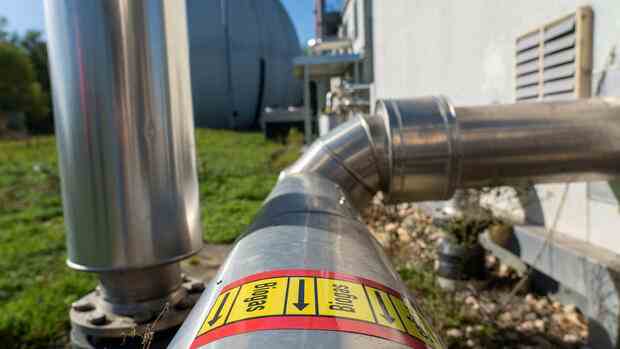The federal government also wants to skim off chance profits from renewable energies in order to finance the electricity price brake.
(Photo: IMAGO/Jochen Tack)
Berlin The electricity and gas price brakes were knitted with a hot needle. A long list of shortcomings emerges from the objections of various interest groups. Some of the requested changes are met with understanding in the government factions. It is often about inaccuracies that can have serious consequences. An overview – without claiming to be complete:
No benefit from avoided network charges
The draft law to introduce the electricity price brake contains a regulation far back that has caused a great deal of excitement among the operators of combined heat and power (CHP) systems. So far, the predominantly small, decentralized CHP systems have benefited from “avoided grid fees”: Since the CHP electricity is consumed directly on site, it only burdens the local grid and not the higher grid levels. In return, the system operators receive a payment from the network operator: the avoided network charges – i.e. a kind of reward for making minimal use of the electricity network.
The Federal Ministry of Economics and Climate Protection (BMWK) now wants to completely overturn this regulation, which has been controversial for years. According to the BMWK, the privilege has so far brought suppliers cost savings of one billion euros per year across all systems. For individual systems, it can quickly amount to millions per year. CHP plants combine the production of electricity and heat. They are particularly efficient.
In particular, the municipal utilities, which operate 4,500 such systems according to industry information, feel overwhelmed. Ingbert Liebing, general manager of the Association of Municipal Enterprises (VKU), described the ministry’s plan as “short-term and arbitrary”. The planned deletion “formally out of nowhere” is a blatant breach of trust that causes bewilderment. Other stakeholders have also criticized the project, including the German Association of Cities and the Federal Association of Energy and Water Industries (BDEW).
Top jobs of the day
Find the best jobs now and
be notified by email.
The criticism has reached the coalition. “The proposal is a disaster for the investment climate. We need reliable framework conditions and no quick-fix actions,” said Markus Hümpfer (SPD), member of the Bundestag’s Committee on Climate Protection and Energy, the Handelsblatt.
Systems operated with combined heat and power achieve higher energy efficiency.
(Photo: mauritius images)
Skimming off proceeds from biogas plants
The federal government wants to skim off random profits from certain types of electricity generation and thus finance the electricity price brake. The renewables industry is also affected: Whether it’s wind turbines or photovoltaic systems – all of them should give up 90 percent of the proceeds above a certain upper limit.
The regulation should also apply to the operators of biogas plants. The industry considers this a fatal mistake. In contrast to wind turbines or photovoltaic systems, the running costs for operators have increased drastically. While wind and sun don’t send any bills, the biogas plant operators have to pay for their energy crops, for example – and more and more.
The industry also complains that with the skimming off of proceeds in the planned amount for biogas plants, there will no longer be any incentive to produce flexibly and according to requirements. SPD politician Hümpfer sees it similarly. The implementation of the previous proposal “would paralyze all efforts of the federal government to secure the energy supply”.
Skimming off proceeds from biogas plants is “the death knell for many plants,” he explained. The SPD is therefore calling for the limit for biogas plants, from which additional proceeds should be skimmed off, to be raised.
No gas price brake for LNG
The draft law on the gas price brake passed by the cabinet provides that the relief will apply to consumers of pipeline-bound natural gas. However, there are companies that use liquefied natural gas (LNG) for their processes, which is delivered by truck, for example. According to the current status of the draft law, these gas consumers will get nothing.
There are different reasons for using LNG instead of pipeline natural gas. For example, there may not be a natural gas pipeline nearby. Joachim von Menges, managing director of the pet food manufacturer Dr. Alder’s hopes the ban on LNG consumers is just an oversight and lawmakers will make adjustments. Otherwise the burden on his company would be existentially threatening.
More: This is how the construction of the LNG terminals is progressing

